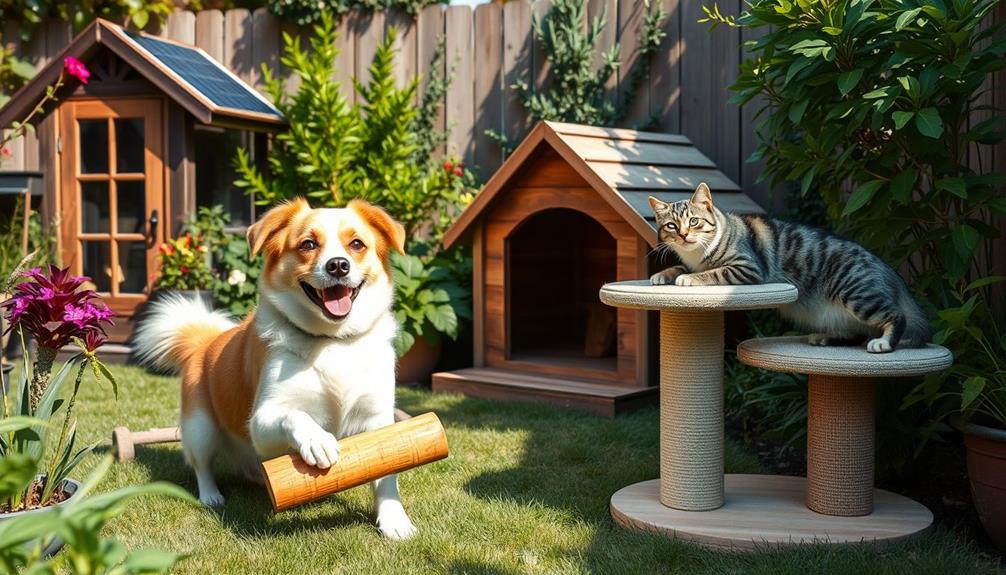Sustainable pet ownership means you can love your furry friends while caring for the planet. Start by using biodegradable poop bags to cut down on waste. Consider vegan or organic pet foods in recyclable containers. Look for toys and collars made from recycled materials to minimize your impact. Adopt from shelters to give pets a second chance and reduce overpopulation. Don't forget about natural care techniques, like organic shampoos and homemade treats, to keep your pets healthy. There's plenty more you can do to make a difference, and exploring eco-friendly options is a great way to begin!
Key Takeaways
- Choose biodegradable poop bags to significantly reduce landfill waste from your pet's waste.
- Opt for organic and locally-sourced pet food to support sustainability and enhance pet nutrition.
- Use eco-friendly toys and collars made from recycled materials to minimize environmental impact.
- Adopt pets from shelters to save lives and combat unethical breeding practices.
- Implement composting for pet waste, ensuring responsible disposal while enriching soil nutrients.
Eco-Friendly Pet Products
When it comes to pet ownership, choosing eco-friendly products can make a significant difference for both your furry friend and the planet. By opting for sustainable pet products, you can actively reduce your pet's environmental footprint.
For instance, using biodegradable poop bags can greatly minimize landfill waste, especially considering American pets produce 5.1 million tons of waste annually. Additionally, many pet food brands are now offering vegan-friendly options that not only support animal welfare but also contribute to a more sustainable diet for pets.
Additionally, consider toys made from recycled materials. These durable toys not only last longer but also help decrease the overall environmental impact.
Eco-friendly accessories like collars and leashes crafted from natural or recycled materials provide safe alternatives while promoting sustainability.
Don't forget about your pet's diet! Selecting plant-based or organic pet food packaged in recyclable containers supports eco-friendly practices and helps cut down on plastic waste in the pet food industry.
Sustainable Feeding Practices
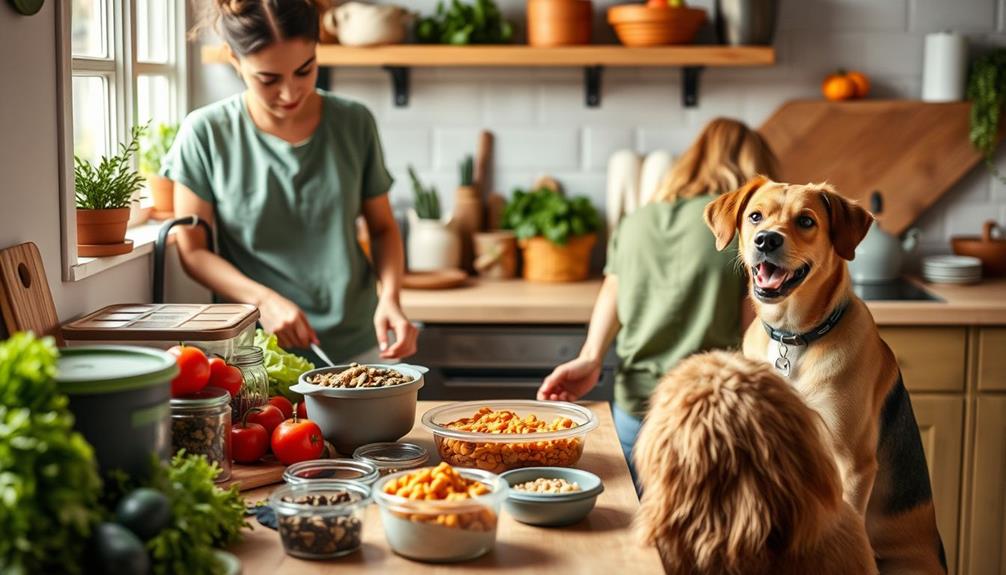
Eco-friendly pet products set the stage for adopting sustainable feeding practices. By choosing organic and locally-sourced pet food, you support regional economies while reducing transportation emissions, ultimately contributing to a smaller carbon footprint. This conscious choice aligns with eco-friendly values and promotes healthier lifestyles for your furry companions.
Additionally, just as with coffee, fresh ingredients can enhance the nutritional value and flavor of your pet's meals; consider exploring specialty beans for espresso that can inspire your ingredient selections.
Consider buying pet food in bulk and using reusable containers. This approach minimizes single-use plastic waste, making your feeding routine more sustainable.
Homemade pet treats are another great option; they allow you to use natural ingredients, ensuring your pets enjoy healthier snacks while reducing reliance on processed foods that can harm the environment.
Don't forget to research pet food brands! Look for those that prioritize sustainable sourcing practices, helping you make informed decisions that reflect your commitment to the planet.
If appropriate for your pet's health, exploring plant-based diets can also greatly lower the environmental impact associated with meat production in the pet food industry.
Waste Management Solutions
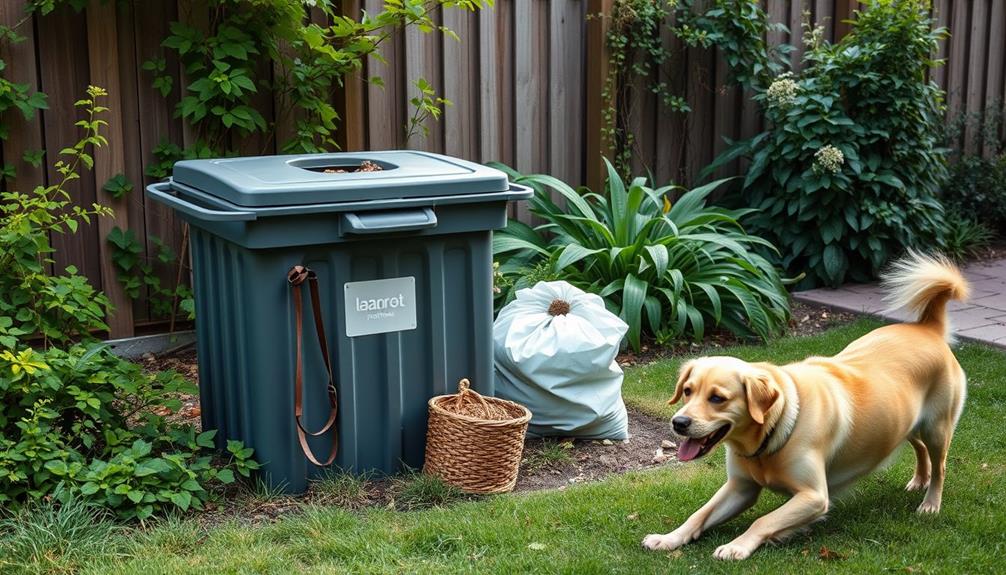
Effective waste management is vital for maintaining a healthy environment, especially given that American pets generate around 5.1 million tons of waste each year.
As a responsible pet owner, you can adopt eco-friendly practices that greatly reduce your pet's impact on the environment. Additionally, understanding the importance of regular vet check-ups can help guarantee your pet remains healthy and reduces the likelihood of health issues that could contribute to waste generation.
Research shows that cats can form emotional attachments, making responsible pet ownership even more important for their well-being and the environment emotional attachment in pets.
Here are some effective strategies for managing pet waste:
- Use biodegradable poop bags: Unlike traditional plastic bags that take hundreds of years to decompose, biodegradable options break down much faster, reducing landfill waste.
- Composting pet waste: Where regulations allow, composting pet waste can return valuable nutrients to the soil while minimizing pollution. Just be sure not to compost waste from sick animals.
- Educate yourself and others: Understanding the impact of pet waste on local water sources is vital. By spreading awareness, you can encourage responsible disposal practices in your community.
Natural Pet Care Techniques
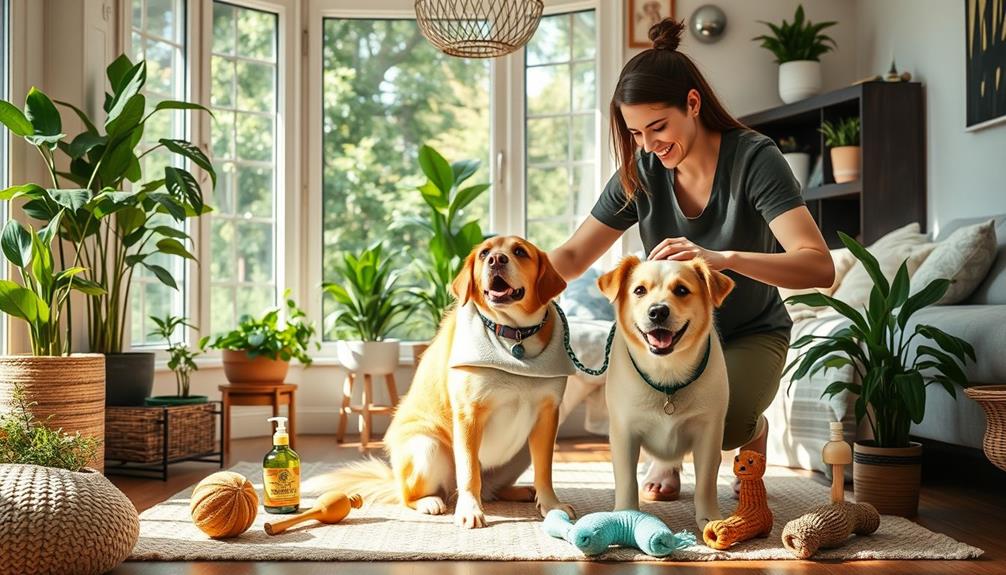
Embracing natural pet care techniques not only benefits your furry friend but also supports a healthier planet. You can enhance your pet's well-being while minimizing your environmental impact by choosing eco-friendly alternatives. For instance, natural remedies like chamomile baths soothe skin irritations without harsh chemicals. Additionally, homemade flea repellents made from essential oils such as lavender and cedar offer a sustainable solution.
Regular grooming is crucial for maintaining hygiene and reducing shedding, which in turn decreases pet hair waste in your home. Opt for organic shampoos and biodegradable grooming products to promote both pet health and environmental sustainability. You can also create DIY cleaning solutions using vinegar and baking soda to tackle messes safely.
| Technique | Benefits | Eco-Friendly Aspect |
|---|---|---|
| Chamomile Baths | Soothe skin irritations | Chemical-free |
| Homemade Flea Repellent | Natural pest control | Biodegradable |
| DIY Cleaning Solutions | Safe for pets and home | Environmentally friendly |
Responsible Pet Adoption
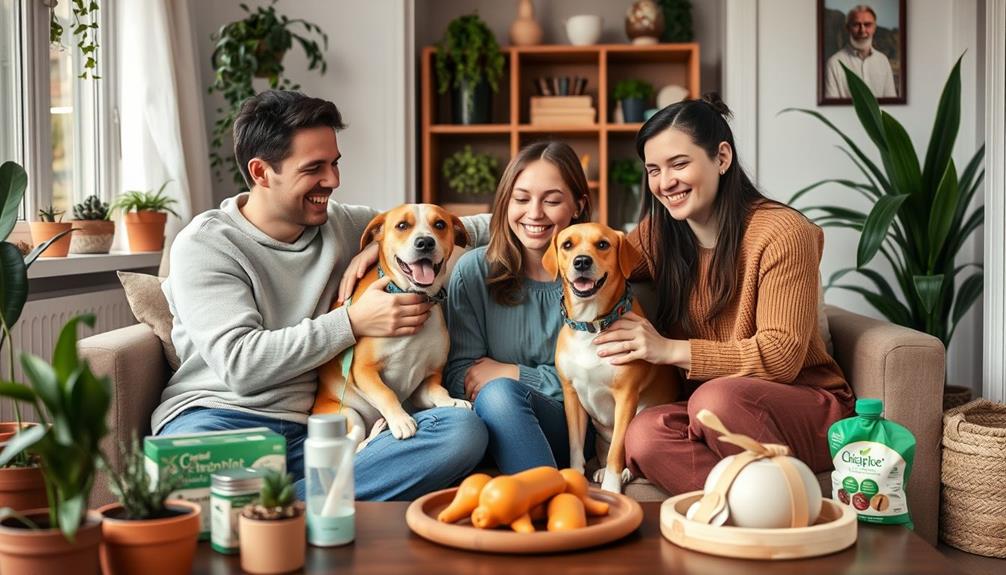
Adopting a pet from a shelter is one of the most impactful decisions you can make for both your new companion and the community. By choosing responsible pet adoption, you not only save the life of an animal but also help combat unethical breeding practices that often arise from puppy mills.
Each year, approximately 3.3 million dogs and 3.2 million cats enter U.S. shelters, and many face euthanasia due to overpopulation. Many of these dogs come with unique names and breeds, such as unique Akita names, which can make the adoption experience even more special.
When you adopt, consider these sustainable practices:
- Spaying or neutering your pet helps control the pet population, preventing the birth of millions of unwanted animals.
- Adopting mixed-breed pets can lead to healthier companions, as they often have fewer genetic health issues.
- Many shelters provide initial veterinary care, allowing you to reduce the long-term costs of pet ownership.
Frequently Asked Questions
How to Be an Eco-Friendly Pet Owner?
To be an eco-friendly pet owner, choose biodegradable waste bags, adopt from shelters, and feed your pet sustainably sourced food. Use natural grooming products and clean with eco-friendly solutions to protect the environment and your furry friend.
Is It Ethical to Keep Animals as Pet?
Imagine a garden, where every pet thrives like blooming flowers. It's ethical to keep animals as pets if you provide love, care, and meet their needs, ensuring they flourish in your home, not just survive.
Is Owning a Dog Sustainable?
Owning a dog can be sustainable if you make mindful choices. Opt for eco-friendly products, adopt from shelters, manage waste responsibly, and prioritize regular exercise. These practices help reduce your pet's environmental impact considerably.
Does Eco-Friendly Mean Safe for Pets?
Eco-friendly doesn't always mean safe for pets. While many eco-friendly products reduce harmful chemicals, you should still check labels and do research. Not all natural ingredients are safe, so be cautious for your pet's well-being.
Conclusion
In your journey as a pet owner, think of yourself as a gardener, nurturing both your furry friend and the planet. By choosing eco-friendly products, adopting sustainable feeding habits, and managing waste responsibly, you're planting seeds for a greener future. Each small step you take not only enriches your pet's life but also creates a ripple effect, inspiring others to embrace these practices. Together, you and your pet can be champions of a healthier, happier world.
